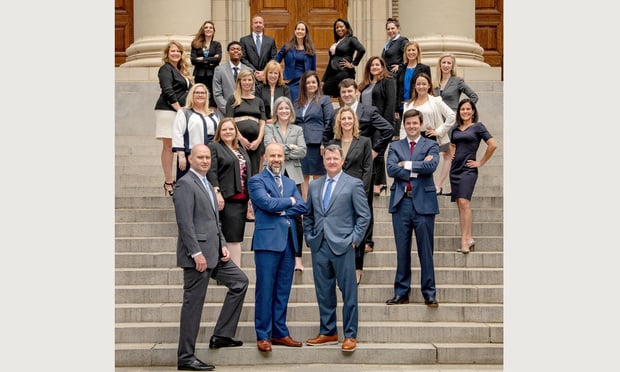Litigation Department, Small, Personal Injury: Harris Lowry Manton
"We trust juries to do the right thing."
June 19, 2019 at 02:00 PM
4 minute read
 Harris Lowry Manton Group (Courtesy photo/Daemon Baizan)
Harris Lowry Manton Group (Courtesy photo/Daemon Baizan)
One of the biggest wins for Harris Lowry Manton in 2018 was an $18 million verdict for a Savannah woman who became paralyzed after being hospitalized for infection. The jury ruled for client Joan Simmons, who was 58 and had worked full-time as an accountant for Colonial Oil Group in Savannah before she became ill and went to the hospital in July 2014, according to court records.
Simmons first went to the emergency room on July 20, 2014, for acute back pain. She was treated and released, according to the plaintiff's summary in the consolidated pretrial order. She went back to the ER 10 days later, suffering from an altered mental state. She was found to have a bloodstream infection. On Aug. 5, an MRI revealed an extensive infection and abscess in her spine, according to her lawyers. She underwent decompression surgery on Aug. 6. She was discharged Sept. 11—paralyzed. Her lawyers alleged the hospital staff failed to diagnose the abscess in time to help her.
In another case, the family of camera assistant Sarah Jones reached a confidential settlement with CSX Transportation over her 2014 death while filming “Midnight Rider” near Savannah.
The undisclosed payment satisfied a $3.9 million judgment against the railroad resulting from apportionment of a total $11.2 million verdict in a 2017 trial. It's the conclusion of litigation against the last of a series of defendants involved in the train crash on the set of a movie about musician Gregg Allman.
Harris Lowry Manton represented Jones' family.
Sarah Jones was 27 when she was struck and killed on the Doctortown, Georgia, trestle. A CSX train hit the movie set where she was working on Feb. 20, 2014, according to the lawsuit. The film “Midnight Rider” was to be a biopic based on Allman's autobiography, “My Cross to Bear.”
The film's director, Randall Miller, served a year in jail after pleading guilty to involuntary manslaughter and criminal trespassing. The railroad blamed Miller and pointed out that the filmmakers were trespassing on the trestle, according to attorneys.
But, like most tragedies that wind up in litigation, firm founder Jeff Harris said, “the story was more complex.” He called the disaster “a joint mistake.”
Harris provided these answers to the Daily Report.
You've won big verdicts and collected large settlements for your clients. What factors go into counseling them on deciding between accepting a settlement and going to trial?
Ultimately, it's the client's decision about whether to accept a settlement or to go to trial. That decision depends, in large part, upon whether the offer to resolve the case is reasonable. If so, a settlement might make sense. If the settlement offer is not reasonable, we counsel our clients about the benefits of letting the jury decide. We trust juries to do the right thing.
The case for Sarah Jones' parents involved multiple defendants and criminal charges against at least one person. How do criminal charges complicate matters for lawyers on the civil litigation side?
Criminal charges can complicate matters, because it's harder to complete the discovery process while prosecutors are putting their case together. However, just because one person was criminally charged doesn't mean that other parties aren't responsible as well. We often see systemic failures that contribute to catastrophic injuries or wrongful death. One person makes a mistake, someone else doesn't catch it, and someone else doesn't follow policies or procedures that are in place. It's not unusual to see a cascade of negligence that ultimately caused the harm. You have to be honest with the jury about the fact that one party is facing criminal charges but that other parties are ultimately responsible as well.
One of your big cases this year was a medical malpractice win. What is your response to occasional calls for the state to adopt a workers' compensation-like system to address medical malpractice—where a board of experts would determine damages?
We don't believe medical malpractice cases should be singled out or treated differently than other types of cases. Medical malpractice cases are part of our civil justice system. We believe it's important to trust the jury system to resolve major issues. It's the foundation of the American judicial process.
This content has been archived. It is available through our partners, LexisNexis® and Bloomberg Law.
To view this content, please continue to their sites.
Not a Lexis Subscriber?
Subscribe Now
Not a Bloomberg Law Subscriber?
Subscribe Now
NOT FOR REPRINT
© 2025 ALM Global, LLC, All Rights Reserved. Request academic re-use from www.copyright.com. All other uses, submit a request to [email protected]. For more information visit Asset & Logo Licensing.
You Might Like
View All
Ex-Deputy AG Trusts U.S. Legal System To Pull Country Through Times of Duress
7 minute read
Q&A: UGA Law School Dean Peter 'Bo' Rutledge on His Transition Back to Private Practice
5 minute read
Morris Manning & Martin's First Chief Strategy Officer Eyes Marketing, Laterals for Growth
3 minute read
How I Made Partner: 'Begin to Build a Personal Brand,' Says Courtney Quiros of Alston & Bird
Trending Stories
- 1'It's Not Going to Be Pretty': PayPal, Capital One Face Novel Class Actions Over 'Poaching' Commissions Owed Influencers
- 211th Circuit Rejects Trump's Emergency Request as DOJ Prepares to Release Special Counsel's Final Report
- 3Supreme Court Takes Up Challenge to ACA Task Force
- 4'Tragedy of Unspeakable Proportions:' Could Edison, DWP, Face Lawsuits Over LA Wildfires?
- 5Meta Pulls Plug on DEI Programs
Who Got The Work
Michael G. Bongiorno, Andrew Scott Dulberg and Elizabeth E. Driscoll from Wilmer Cutler Pickering Hale and Dorr have stepped in to represent Symbotic Inc., an A.I.-enabled technology platform that focuses on increasing supply chain efficiency, and other defendants in a pending shareholder derivative lawsuit. The case, filed Oct. 2 in Massachusetts District Court by the Brown Law Firm on behalf of Stephen Austen, accuses certain officers and directors of misleading investors in regard to Symbotic's potential for margin growth by failing to disclose that the company was not equipped to timely deploy its systems or manage expenses through project delays. The case, assigned to U.S. District Judge Nathaniel M. Gorton, is 1:24-cv-12522, Austen v. Cohen et al.
Who Got The Work
Edmund Polubinski and Marie Killmond of Davis Polk & Wardwell have entered appearances for data platform software development company MongoDB and other defendants in a pending shareholder derivative lawsuit. The action, filed Oct. 7 in New York Southern District Court by the Brown Law Firm, accuses the company's directors and/or officers of falsely expressing confidence in the company’s restructuring of its sales incentive plan and downplaying the severity of decreases in its upfront commitments. The case is 1:24-cv-07594, Roy v. Ittycheria et al.
Who Got The Work
Amy O. Bruchs and Kurt F. Ellison of Michael Best & Friedrich have entered appearances for Epic Systems Corp. in a pending employment discrimination lawsuit. The suit was filed Sept. 7 in Wisconsin Western District Court by Levine Eisberner LLC and Siri & Glimstad on behalf of a project manager who claims that he was wrongfully terminated after applying for a religious exemption to the defendant's COVID-19 vaccine mandate. The case, assigned to U.S. Magistrate Judge Anita Marie Boor, is 3:24-cv-00630, Secker, Nathan v. Epic Systems Corporation.
Who Got The Work
David X. Sullivan, Thomas J. Finn and Gregory A. Hall from McCarter & English have entered appearances for Sunrun Installation Services in a pending civil rights lawsuit. The complaint was filed Sept. 4 in Connecticut District Court by attorney Robert M. Berke on behalf of former employee George Edward Steins, who was arrested and charged with employing an unregistered home improvement salesperson. The complaint alleges that had Sunrun informed the Connecticut Department of Consumer Protection that the plaintiff's employment had ended in 2017 and that he no longer held Sunrun's home improvement contractor license, he would not have been hit with charges, which were dismissed in May 2024. The case, assigned to U.S. District Judge Jeffrey A. Meyer, is 3:24-cv-01423, Steins v. Sunrun, Inc. et al.
Who Got The Work
Greenberg Traurig shareholder Joshua L. Raskin has entered an appearance for boohoo.com UK Ltd. in a pending patent infringement lawsuit. The suit, filed Sept. 3 in Texas Eastern District Court by Rozier Hardt McDonough on behalf of Alto Dynamics, asserts five patents related to an online shopping platform. The case, assigned to U.S. District Judge Rodney Gilstrap, is 2:24-cv-00719, Alto Dynamics, LLC v. boohoo.com UK Limited.
Featured Firms
Law Offices of Gary Martin Hays & Associates, P.C.
(470) 294-1674
Law Offices of Mark E. Salomone
(857) 444-6468
Smith & Hassler
(713) 739-1250






